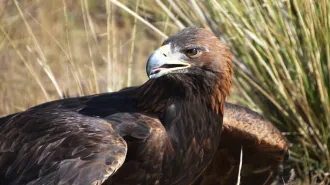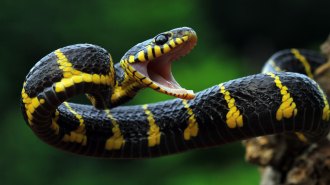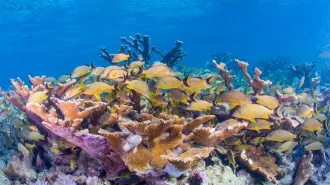Lizards everywhere may be scampering a little taller now that an Anolis species from tropical tree canopies has passed tests for behavioral flexibility.

“These guys are smarter than people say,” reports behavioral ecologist Manuel Leal of Duke University in Durham, N.C. Cognitive scientists have studied birds’ and mammals’ powers to solve unexpected problems and learn new rules, but research on lizard cognition has been limited.
Yet several Anolis evermanni lizards collected from Puerto Rico and brought into the lab coped with devices not seen in nature that were modeled on tests of avian brain power, Leal and Brian Powell, also of Duke, report in an upcoming issue of Biology Letters. In a series of tests, four out of six lizards figured out how to remove plastic lids firmly stuck on a food box and how to ignore lids with other colors introduced as possible distractors. Two lizards eventually were able to undo their previous training and choose the “wrong” color because researchers had reversed the rules.
Lizards indeed deserve more respect, says Walter Wilczynski of Georgia State University in Atlanta, who studies the neural basis of animal behavior. “I agree with the authors that reptiles, and amphibians for that matter, are generally dismissed as being incapable of the simplest cognitive task,” he says, “despite the fact that whenever researchers do a careful study like this one, it turns out that, in fact, they do learn, often in a sophisticated way.”
Wilczynski’s lab has demonstrated that whiptail lizards can learn and unlearn tasks, and researchers led by Gordon Burghardt of the University of Tennessee at Knoxville have described monitor lizards learning how to get food out of a lab device. Two research groups including Burghardt’s have even demonstrated that turtles can learn how to do tasks by watching turtle peers.
Alex Kacelnik of Oxford University in England, who studies cognition in New Caledonian crows, was not exactly wowed by the Anolis lizards, though. The ability to discriminate among options, and reverse that learning, is also known in fish, flies and bees, among other animals, he says. “It may well be that lizards do have the same flexibility shown by other taxa,” Kacelnik says, “but the results shown here are nowhere near what we know in birds and mammals.”
Figuring out which animal lineages can manage what mental acrobatics could reveal much about how cognition has evolved. One of the charms of the Anolis study, Burghardt says, is that demonstrating behavioral flexibility in a well-known species that is easily maintained in the lab could inspire a new wave of research on reptile cognition, which might finally let a lizard get some respect.







